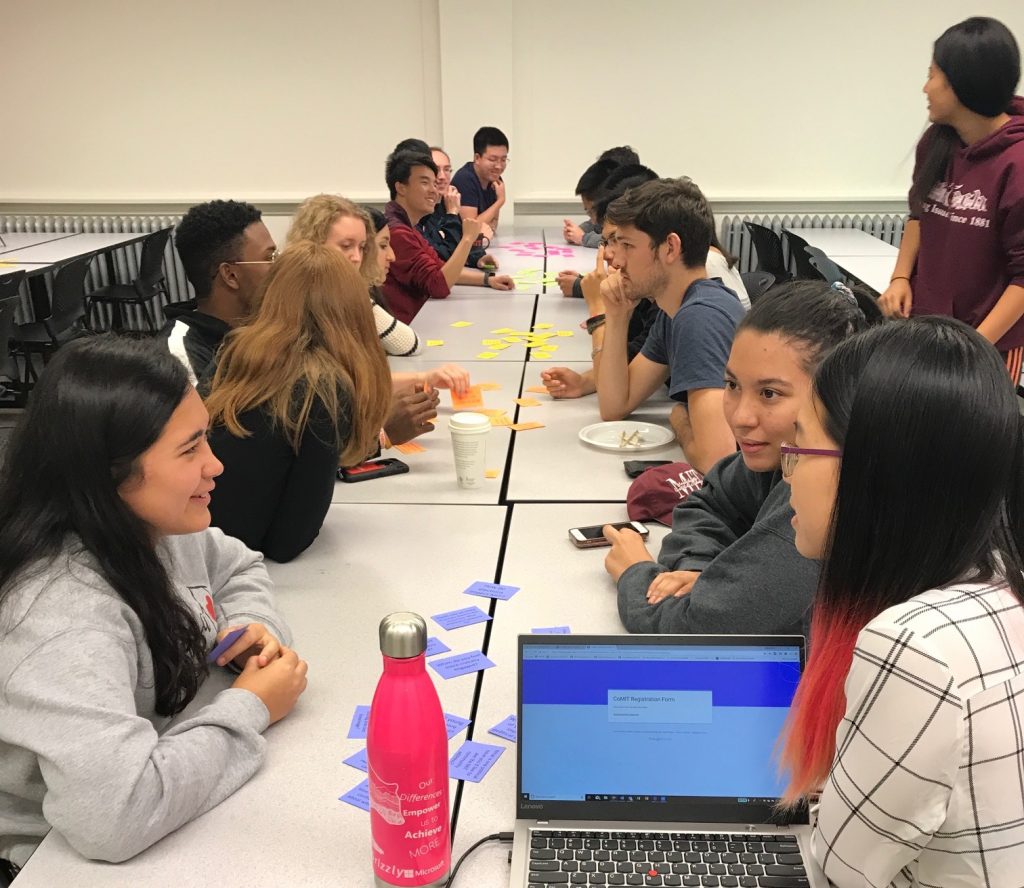Meet COMIT: The MIT Student Group for Civic Engagement (and Food)

by Devon Capizzi
Sarah Powazek wants to talk to you. A junior studying political science (Course 17) at MIT, Sarah Powazek wants to talk to a lot of people, actually. Whether it’s about voter registration, technology and free speech, or how personal experience informs political beliefs, what Powazek really wants is for everybody to drop what they’re doing, sit down to dinner, and talk to each other. Sarah Powazek wants MIT to start talking: in person, with food.
Powazek is a leading member of the new MIT student group called COMIT (Community Organizers of MIT). Loosely founded in Fall of 2017, and formerly known as the Civic Engagement Dinners, COMIT is coming into the 2018-19 academic year with a view of honest, open communication and a real focus on how to make these conversations both consistent and accessible. “COMIT [right now] is very abstract,” Powazek says of the group, “we’re really looking for a cultural shift on campus surrounding the idea of civic engagement.” The group aims to do this in two main ways: free dinner and casual conversation.
MIT has a well-established culture of facts and data. In COMIT’s first dinner of the semester, they found this culture alive and well, asking new and returning members to reflect on civic engagement and political discourse on campus. The room was split into smaller groups over a family-style dinner, and while responses varied, from group to group and student to student, a single thread seemed to tie them all together: fear. COMIT leadership found fear a major barrier to political discourse and conversation. Some students were afraid of being judged for their political beliefs. Others, in what Powazek calls true MIT fashion, feared they didn’t have sufficient facts and figures to substantiate their beliefs. Students often withdrew from political discourse for fear of not being correct, of not having the right answer.
But, as Powazek says, “we’re not trying to reach an answer.” For COMIT, it’s more important “to understand when and where people disagree and why, not to debate it, just to understand it.” This is the kind of space the group envisions for the MIT community, a space of conversation, a space to learn from others and to share of yourself. The group strives to value personal experience just as much as scientific data; they want to level that playing ground.
“One of my main goals,” Powazek says, “is to enable people to feel like they do know enough to participate… I think it’s valuable to have a conversation about something that you’re not an expert on.” Powazek believes personal identity and experience are often enough to prepare students to engage in political discourse, which is why COMIT is so loosely structured. “It’s very discussion-based: please come, and eat, and participate.” It’s about listening to and learning from your community; it’s not always about having the answers. It’s about trying to find them.
For issues that are more complicated, like immigration or housing or even identity politics (all potential themes for future dinners on campus), Powazek explains, the group feels supplemental readings and outside resources are sometimes necessary to give students greater context, to equip students with enough knowledge to form their own stances and beliefs. COMIT is working to refine these resources, and even working hard to schedule speakers for upcoming events and dinners.
But still at the heart of COMIT is the idea that personal experience, lived experience, is not only valid in this kind of discourse, but also necessary and often poignant. “A lot of what we care about, and how we vote,” Powazek says, “has nothing to do with facts or data. It has to do with what we’ve experienced… and there can be a lot of pushback to that at MIT.” COMIT hopes to think critically about that pushback, and to show the value of face-to-face conversation and human connection when it comes to civic engagement. Their results, even so early on in the group’s formation, have been outstanding.
“I’ve been amazed,” Powazek says of the response, not only of the students and faculty who participate in COMIT dinners, but also of the liaisons COMIT has worked to form across departments and student organizations on MIT’s campus. “People are really proactive about talking,” she says. “Once you give them something to chew on, and then back off, it’s just amazing.” Powazek says it’s this kind of response that shows her this space is necessary, that COMIT has a real place at MIT: “people just won’t stop talking.”
“The best thing I can do for this campus,” Powazek says, “is create a pace [of civic engagement and political discourse], so that when freshman come in, there is already a pathway for them to follow.” This is the cultural and structural shift COMIT is hoping for, to not only affect their own experience at MIT, but also to carve out a space that is long-lasting, welcoming and nonpartisan. “My dream,” Powazek says, “is that four years from now MIT will have a vibrant civic engagement culture… it won’t even be a question.”
—
Register to vote at mit.turbovote.org
To get in touch with COMIT, and to find out how you can get involved on campus, e-mail Sarah Powazek at comit-exec@mit.edu
If you need help registering to vote in this year’s election, please visit MITVote2018 on Facebook, or e-mail voter-2018-chair@mit.edu
